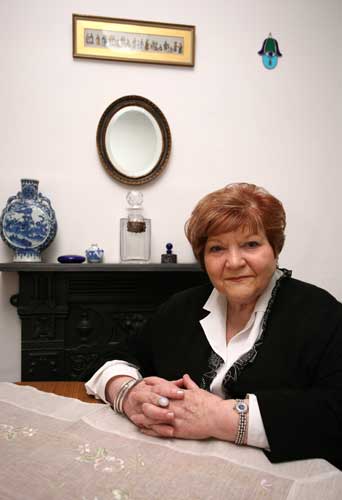First person: 'I tended to the survivors at Belsen'
Helen Bamber, 83

I was born to a non-orthodox Jewish family in north London. My father helped refugees escape Nazi Germany; some would stay at our house. I suffered from bronchitis and was always in bed, so visitors would come and tell me about what was happening, what they'd lost and the cruelty they'd escaped.
My father became increasingly depressed by the state of the world; I felt that something must be retrieved from this mess. In my late teens, I trained in secretarial work and administration, and was appointed to the National Association of Mental Health, which treated returning soldiers and airmen. There I gained considerable insight into trauma. Aged 19, I joined the Jewish Relief Unit (JRU): a small group of doctors, nurses and others with relevant skills, under the auspices of UNRRA (the United Nations Relief and Rehabilitation Administration).
In 1945, I was made personal assistant to the director of the JRU, tending to survivors of the Holocaust at Belsen concentration camp. I will never forget that dreadful train ride. Along the tracks, German children held out their hands, begging soldiers onboard for food. I had been bought up to loathe the Nazis, but seeing these pathetic little figures I had a sudden understanding of war and what it does. My first impression of Belsen was the smell: dank, sweet and quite distinctive. I asked a colleague: "What is that?" and she replied: "That's the smell of death."
Belsen was a dreadful place. The survivors needed to tell me everything over and over. I had to take it all. It was important that I held them. Often I had to rock with them. Many spoke in Yiddish but we didn't need language; I just had to hang on to them and receive it, as if it belonged to me. In the act of taking it, of showing I was available, I was playing some useful role. This was the first great lesson: to receive horror, not to recoil from it; to respond to it and bear witness.
The second lesson I learnt was how quickly compassion can die. When Belsen was liberated by the British army, the soldiers felt a great need, a compulsion, to save those who could be saved; but this took time and survivors became more demanding. They didn't want to be treated as pitiful victims. They wanted to leave the camp, but Europe was in chaos, and many could not go back home. Many were killed if they tried. They had nowhere to go and some stayed at Belsen until 1950.
They wanted a solution, and eventually those in control became less tolerant of their needs. I watched their compassion wither. From that I learned how important it is to hold on to compassion, to open yourself to a person's suffering, to bear witness to their stories and never forget what you've heard.
Helen Bamber runs the Helen Bamber Foundation, which works with survivors of human-rights violations: helenbamber.org
firstperson@independent.co.uk
Join our commenting forum
Join thought-provoking conversations, follow other Independent readers and see their replies
Comments
Bookmark popover
Removed from bookmarks